Modi can abandon the path of Hindutva only at risk to his position within his own fraternity.
But if he pursues a hard line, he faces the risk of being hauled up by his coalition partners.
For the first time in a decade, Modi is not in an enviable situation, observes Nilanjan Mukhopadhyay.

The Bharatiya Janata Party and affiliated organisations of the Sangh Parivar made a transition in the late 1980s from being a peripheral political party to the 'government in waiting' as L K Advani worded it in 1991, courtesy advocacy of no-holds-barred Hindutva.
The BJP accomplished this feat by normalising the latent sentiment among large number of Hindu Indians that Muslim Indian were 'foreigners' whose 'forefathers' had 'usurped' countless Hindu temples and these should be 'returned' to the majority community.
The 1991 Lok Sabha election was the first occasion when a large number of Hindus voted for the BJP on the basis of religious identity and support for the Ram temple agitation. In time, it became the prototype of numerous agitations with similar demands in different towns and cities.
I consider 1991 as the BJP's come-of-age poll and not 1989 because the latter was contested after making seat adjustments with other non-Congress parties, whereas in 1991, the BJP was totally on its own.
Its tally may even have been greater than 120, which it bagged, had Rajiv Gandhi not been assassinated midway through polling.
The BJP performed more creditably on its own because it demarcated a Hindu majoritarian electoral constituency by vitiating social harmony.
This was done by taking out the Somnath to Ayodhya Rath Yatra in September-October 1990, with Advani as lead 'charioteer'.
This Rath Yatra was the response of a panic-stricken party after Prime Minister VP Singh's announcement to implement recommendations of the Mandal Commission report making 27% reservations for the Other Backward Castes in educational institutions and government jobs.

The unscheduled declaration was opposed mainly by upper caste Hindus and led to the tragic incident of Delhi University graduate student Rajiv Goswami's attempted self-immolation.
Advani's decision to embark on a motorised yatra was his last-ditch effort to reunite Hindus across castes as was done through the Ram temple agitation.
As Singh's announcement had caused vertical cleavages among Hindus, Advani felt that their reunification was possible on basis of an issue that every Hindu caste group supported.
Advani's chariot left blood and gore in its wake. Between September 1 and November 20, 1990 there were 116 communal riots leaving 564 people dead.
Although Advani was not allowed to complete his Yatra which was terminated with his arrest in Samastipur, Bihar by then chief minister Lalu Yadav's government, the campaign succeeded in its objectives.
Singh resigned and mid-term polls were called in early 1991 and the BJP became the second largest party in Lok Sabha, with Advani becoming Leader of the Opposition.
Since then, hard-nosed Hindutva has been the BJP's 'go-to' agenda. Whenever the party faltered in its march towards political power, it revived the aggressive Hindu supremacist politics.
Following the collapse of the BJP's first government at the Centre in May 1996 due to failure to secure support of other parties, the party relegated contentious demands on the back seat.
The two coalition governments headed by Atal Bihari Vajpayee from March 1998 to May 2004 did not raise three most-debatable objectives of the BJP: construction of Ram temple, abrogation of Article 370 and introduction of the Uniform Civil Code.
Individual leaders of the BJP continued to voice the language of the extreme fringe. Narendra Modi, then Gujarat chief minister was one of them.

In 2002, in the course of the first assembly election which he successfully led, Modi took recourse to intemperate language in his speeches.
In September, in the temple town of Becharji, Mehsana district, he referred to riot-relief camps for Muslims which his government was shutting down.
He claimed, the Congress criticised every action of his government if Hindus were benefited, like redevelopment of temples. 'What brother?' Modi asked mockingly, and added, 'Should I start baby producing centres there??
The chief minister did not stop there and maintained this pitch throughout the campaign. He won those elections as also those in 2007 and 2012 before moving centre stage in 2014.
Many party leaders, including Vajpayee, attributed the defeat in 2004 to failure to take decisive action against perpetrators of the Gujarat riots.
In 2005, Advani spoke glowingly about M A Jinnah during his visit to Pakistan. Only Modi remained firm on advocacy of hard Hindutva.
After 2014, there are countless examples of the BJP resorting to extreme positions whenever the government, Modi or party was in a spot.

In the 2024 Lok Sabha polls too, when it became clear that the euphoria over the Ram temple's construction had faded and when turnout in the first phase of polls was fairly low, Modi delivered the contentious speech in Banswara, Rajasthan wherein he spoke in the same pitch as in 2002.
This speech was layered in anti-Muslim rhetoric. He said the Congress will snatch people's wealth and 'distribute it to those who have more children and infiltrators'.
Despite the failure of the hardline narrative to secure a parliamentary majority for the BJP, the party and the government continue resorting to such divisive politics.
Without mentioning the issue in its elections manifestos for the Lok Sabha elections in 2024 and 2019, the Centre, without adequate consultation with any representative Muslim body, hastily introduced the Waqf Bill.
The BJP, had stated in its election manifesto in 2009 that the party would 'examine the recommendations of the Joint Parliamentary Committee regarding Waqf properties headed by Shri K Rahman Khan, Deputy Chairman, Rajya Sabha, and would, in consultation with Muslim religious leaders, take steps to remove encroachments from and unauthorised occupation of waqf properties.'
This promise was repeated in 2014. On both occasions, the promise was to: 'Empower Waqf Boards in consultation with religious leaders; taking steps to remove encroachments from and unauthorized occupation of Waqf properties.'
Two pledges on the issue of Waqf properties were noteworthy: One, that prior to any amendments in existing law, the government shall hold consultations with (Muslim) religious leaders; and two, the government shall take steps to remove encroachments from and prevent unauthorized occupation of Waqf properties.
It is evident that the Centre reneged on previous promise for wide consultation before introducing amendments to existing law.
Although the party was forced to refer the Bill to a Joint Parliamentary Committee, it has set a short deadline for the 31-member body to submit its report by the end of the first week of the Winter session of Parliament.
This underscores the government's malafide intentions. The short deadline has been set with the intention of securing its passage almost immediately after the BJP secures a majority in the Rajya Sabha that is expected after next month's bye-elections to 12 seats.
The other improper proposal in the Bill is the inclusion of non-Muslims in Waqf boards.
It is undeniable that Waqfs are Muslim properties and their administration must remain in the hands of fellow religionists just as Hindu, Sikh, Christian and Parsi Trusts are controlled by citizens of those religious communities.

Like most majoritarian decisions of the government, the primary intention in this case too has been to blow a dog-whistle to the BJP's supporters in the Hindu community.
The intention of this new Waqf Bill or numerous other steps and statements of BJP leaders is simple: broadcasting the message that this government is not giving Muslims any leeway and instead, strictly regulating their existence.
Since 2014, the BJP has adroitly communicated to its principal Hindu supremacist voter base, that the rights and liberties of the Muslims have been curtailed.
The BJP faces another problem -- reduced hegemony of the party's central leadership over the state units and satraps.
As a result, several leaders in the states are keen on projecting a distinctive public image of their own by adopting an equally hard Hindutva stance.
Already, the chief ministers of Uttar Pradesh and Assam, Yogi Adityanath and Himanta Biswa Sarma, have since the Lok Sabha results gone ballistic.
While the former hastily issued the order making it mandatory for food stall owners on the Kanwar Yatra route to prominently display the name of the owner, strengthened the anti-conversion law and revived the 'Romeo' squads, Sarma is regularly making provocative statements targeting Muslims.
Sarma currently is not caught in rivalry with the party's central leadership but is clearly carving his distinctive image, and does not wish to remain dependent on the party brass. The strategy reflects less confidence in Modi's vote-drawing capacity.
Adityanath however, has been locked in a game of one-upmanship with the central leadership from 2017 after becoming chief minister.
Following the party's poor performance in UP in the parliamentary polls, the effort of both camps is to hold the other responsible for this debacle.
This is being done by underscoring oneself as the truer Hindutva champion. This explains why the central and state leaderships are trying to establish themselves as the 'real' Hinduva enthusiasts.
Adityanath only faces a threat to his position from within his own party. This is because the Opposition's numbers do not stack up to his disadvantage in the state assembly.
But Modi has to take care of two fronts simultaneously. He can abandon the path of Hindutva only at risk to his position within his own fraternity.
But if he pursues a hard line, he faces the risk of being hauled up by his coalition partners. For the first time in a decade, Modi is not in an enviable situation.
Nilanjan Mukhopadhyay is an author and journalist based in Delhi-NCR.
His latest book is The Demolition, The Verdict and The Temple: The Definitive Book on the Ram Mandir Project.
He is also the author of Narendra Modi: The Man, The Times.
Feature Presentation: Rajesh Alva/Rediff.com


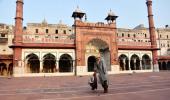
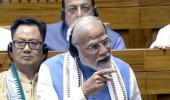
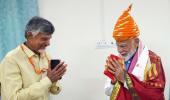



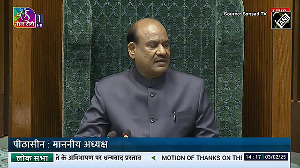
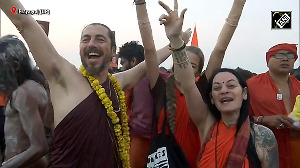

 © 2025
© 2025